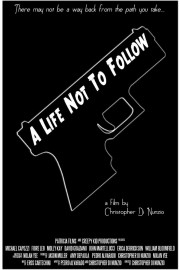A Life Not to Follow
It never ceases to amaze me how durable, and flexible, the gangster film has remained over the years. You would think that, thanks for “The Godfather” trilogy, Martin Scorsese, “Heat” and “The Sopranos,” nothing was left to say from the genre. And yet, every few years, someone spins a new tale about criminals and the underbelly of society that digs in, finds something fresh (or at least a fresh way of presenting it), and is impossible to ignore. Independent cinema is the big place where this rejuvenation seems to be taking place, and it’s the relative freedom of not having to be responsible for hundreds of millions of dollars, and not having business-minded studio executives looking over their shoulders, that is allowing this to take place. God bless independent cinema.
The movie that has me considering this is “A Life Not to Follow,” which is co-written and directed by Christopher Di Nunzio. Di Nunzio has proven himself to be a smart and versatile filmmaker since I watched my first film of his back in 2010, a documentary called “Viva! Saint Agrippina.” No film I’ve seen since from him has been like the one that preceded it, and while he did share a crime story with me in his last short, “Under the Dark Wing,” the perspective and narrative couldn’t be more different from “A Life Not to Follow.” To be honest, the narrative of his latest is a bit more predictable, and adheres more to archetypes, than that one does, but the way he approaches narrative structure is what turns it into a gripping dramatic work.
The film begins with Eric (Fiore Leo), a hitman for a local crime family who is having a drink in the bar his girlfriend works. He has a grim look on his face; when his girlfriend presses him, he tells her about the events leading up to the violence about to transpire. The night before, he and a girl set up some high-up members of the family he works for who have a tendency towards sexual assault. He kills them, but rather than running, he would rather face the consequences himself. He has enlisted a friend, Luca (Michael Capozzi), to help him, but not all honor among thieves remains when money, and power, are involved. The result is a bloodbath, but it’s not the end of Luca’s story, and we will learn more about Eric’s later when we see things from the perspective of a private detective (David Graziano), who seems to have a personal connection to the young woman Eric enlists to his scheme.
By showing us a key event up front in Eric at the bar where he will make his last stand, and rather than immediately going backwards in time, following a different character, Di Nunzio is following in a different path than something like “GoodFellas” or “Jackie Brown,” which flashed back and forth in time, and to different perspectives, while always having a common narrative center. We never see Eric again after his last stand, but it’s debatable whether Luca becomes the main character, especially since the private detective drives the narrative in the last third of the film. This isn’t “Sin City,” though, because all three characters are integral parts of the larger story being told. This is a different way of telling a single story, by showing three people, each with different “ins” into the story, and seeing how the life they live in impacts their mindset. Actually, thinking about that, the film has a lot in common with “GoodFellas,” but unlike that masterpiece, it’s main characters don’t seem to see the world they live in as a jumping off point to bigger and better things, but a dead end that will swallow them whole, even if it takes them to the end of their lives to see it. It’s a potent message that makes Di Nunzio’s film a worthy entry into a decades-long legacy of gangster films; the way he approaches that message makes it one of the best ones.










